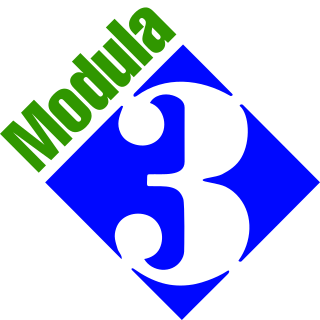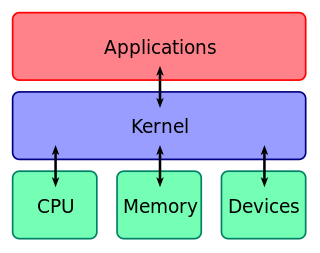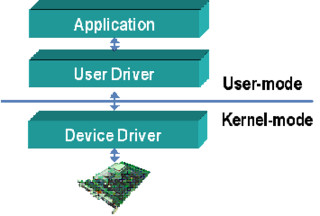Related Research Articles
Mesa is a programming language developed in the mid 1970s at the Xerox Palo Alto Research Center in Palo Alto, California, United States. The language name was a pun based upon the programming language catchphrases of the time, because Mesa is a "high level" programming language.

In computer science, a microkernel is the near-minimum amount of software that can provide the mechanisms needed to implement an operating system (OS). These mechanisms include low-level address space management, thread management, and inter-process communication (IPC).

Oberon is a general-purpose programming language first published in 1987 by Niklaus Wirth and the latest member of the Wirthian family of ALGOL-like languages. Oberon was the result of a concentrated effort to increase the power of Modula-2, the direct successor of Pascal, and simultaneously to reduce its complexity. Its principal new feature is the concept of data type extension of record types. It permits constructing new data types on the basis of existing ones and to relate them, deviating from the dogma of strict static typing of data. Type extension is Wirth's way of inheritance reflecting the viewpoint of the parent site. Oberon was developed as part of the implementation of an operating system, also named Oberon at ETH Zurich in Switzerland. The name was inspired both by the Voyager space probe's pictures of the moon of the planet Uranus, named Oberon, and because Oberon is famous as the king of the elves.
An object-oriented operating system is an operating system that is designed, structured, and operated using object-oriented programming principles.

Modula-3 is a programming language conceived as a successor to an upgraded version of Modula-2 known as Modula-2+. It has been influential in research circles, but it has not been adopted widely in industry. It was designed by Luca Cardelli, James Donahue, Lucille Glassman, Mick Jordan, Bill Kalsow and Greg Nelson at the Digital Equipment Corporation (DEC) Systems Research Center (SRC) and the Olivetti Research Center (ORC) in the late 1980s.
ARX was an unreleased Mach-like operating system written in Modula-2+ developed by Acorn Computers Ltd in the Acorn Research Centre (ARC) United Kingdom (UK) and later by Olivetti—which purchased Acorn—for Acorn's new Archimedes personal computers based on the ARM architecture reduced instruction set computer (RISC) central processing unit (CPUs).

The Oberon System is a modular, single-user, single-process, multitasking operating system written in the programming language Oberon. It was originally developed in the late 1980s at ETH Zurich. The Oberon System has an unconventional visual text user interface (TUI) instead of a conventional command-line interface (CLI) or graphical user interface (GUI). This TUI was very innovative in its time and influenced the design of the Acme text editor for the Plan 9 from Bell Labs operating system.

A virtual file system (VFS) or virtual filesystem switch is an abstract layer on top of a more concrete file system. The purpose of a VFS is to allow client applications to access different types of concrete file systems in a uniform way. A VFS can, for example, be used to access local and network storage devices transparently without the client application noticing the difference. It can be used to bridge the differences in Windows, classic Mac OS/macOS and Unix filesystems, so that applications can access files on local file systems of those types without having to know what type of file system they are accessing.
RTLinux is a hard realtime real-time operating system (RTOS) microkernel that runs the entire Linux operating system as a fully preemptive process. The hard real-time property makes it possible to control robots, data acquisition systems, manufacturing plants, and other time-sensitive instruments and machines from RTLinux applications. The design was patented. Despite the similar name, it is not related to the Real-Time Linux project of the Linux Foundation.
The V operating system is a discontinued microkernel distributed operating system that was developed by faculty and students in the Distributed Systems Group at Stanford University from 1981 to 1988, led by Professors David Cheriton and Keith A. Lantz. V was the successor to the Thoth operating system and Verex kernel that Cheriton had developed in the 1970s. Despite similar names and close development dates, it is unrelated to UNIX System V.
Cecil is a pure object-oriented programming language that was developed by Craig Chambers at the University of Washington in 1992 to be part of the Vortex project there. Cecil has many similarities to other object-oriented languages, most notably Objective-C, Modula-3, and Self. The main goals of the project were extensibility, orthogonality, efficiency, and ease-of-use.

MonetDB is an open-source column-oriented relational database management system (RDBMS) originally developed at the Centrum Wiskunde & Informatica (CWI) in the Netherlands. It is designed to provide high performance on complex queries against large databases, such as combining tables with hundreds of columns and millions of rows. MonetDB has been applied in high-performance applications for online analytical processing, data mining, geographic information system (GIS), Resource Description Framework (RDF), text retrieval and sequence alignment processing.
In computing, ioctl is a system call for device-specific input/output operations and other operations which cannot be expressed by regular file semantics. It takes a parameter specifying a request code; the effect of a call depends completely on the request code. Request codes are often device-specific. For instance, a CD-ROM device driver which can instruct a physical device to eject a disc would provide an ioctl request code to do so. Device-independent request codes are sometimes used to give userspace access to kernel functions which are only used by core system software or still under development.
Scheduler activations are a threading mechanism that, when implemented in an operating system's process scheduler, provide kernel-level thread functionality with user-level thread flexibility and performance. This mechanism uses a so-called "N:M" strategy that maps some N number of application threads onto some M number of kernel entities, or "virtual processors." This is a compromise between kernel-level ("1:1") and user-level ("N:1") threading. In general, "N:M" threading systems are more complex to implement than either kernel or user threads, because both changes to kernel and user-space code are required.
In computer sciences, the separation of protection and security is an application of the separation of mechanism and policy principle. The protection mechanism is supposed to be a component that implements the security policy. However, many frameworks consider both as security controls of varying types. For example, protection mechanisms would be considered technical controls, while a policy would be considered an administrative control.

A kernel is a computer program at the core of a computer's operating system that always has complete control over everything in the system. The kernel is also responsible for preventing and mitigating conflicts between different processes. It is the portion of the operating system code that is always resident in memory and facilitates interactions between hardware and software components. A full kernel controls all hardware resources via device drivers, arbitrates conflicts between processes concerning such resources, and optimizes the utilization of common resources e.g. CPU & cache usage, file systems, and network sockets. On most systems, the kernel is one of the first programs loaded on startup. It handles the rest of startup as well as memory, peripherals, and input/output (I/O) requests from software, translating them into data-processing instructions for the central processing unit.

Device drivers are programs which allow software or higher-level computer programs to interact with a hardware device. These software components act as a link between the devices and the operating systems, communicating with each of these systems and executing commands. They provide an abstraction layer for the software above and also mediate the communication between the operating system kernel and the devices below.
Verve is a research operating system developed by Microsoft Research. Verve is verified end-to-end for type safety and memory safety.
In computer science, dynamic software updating (DSU) is a field of research pertaining to upgrading programs while they are running. DSU is not currently widely used in industry. However, researchers have developed a wide variety of systems and techniques for implementing DSU. These systems are commonly tested on real-world programs.
Emin Gün Sirer is a Turkish-American computer scientist. Sirer developed the Avalanche Consensus protocol underlying the Avalanche blockchain platform, and is currently the CEO and co-founder of Ava Labs. He was an associate professor of computer science at Cornell University, and is the former co-director of The Initiative for Cryptocurrencies and Smart Contracts (IC3). He is known for his contributions to peer-to-peer systems, operating systems and computer networking.
References
- ↑ Bershad, Brian N.; Savage, Stefan; Pardyak, Przemys; Sirer, Emin Gün; Fiuczynski, Marc E.; Becker, David; Chambers, Craig; Eggers, Susan (1995). "Extensibility, safety and performance in the SPIN operating system". Proceedings of the 15th ACM Symposium on Operating System Principles (SOSP-15): 267–284.
- ↑ Bershad, Brian N.; Chambers, Craig; Eggers, Susan; Maeda, Chris; Mcnamee, Dylan; Pardyak, Przemyslaw; Savage, Stefan; Sirer, Emin Gün (1994). "SPIN: an extensible microkernel for application-specific operating system services". Proceedings of the 6th ACM SIGOPS European Workshop: Matching Operating Systems to Application Needs: 68–71.
- ↑ Dion, David (1996). "A User-Level Unix Server for the SPIN Operating System". University of Washington Technical Report UW-CSE-96-11-01.